新标准大学英语第二册U2 Mixed Feelings讲稿
新标准大学英语(第二版)综合教程2 Unit 2 B篇练习答案及课文翻译(ppt课件)

学习交流课件
9
Text
Background information
➢ Emotional Intelligence is a book written by Daniel Goleman and published in 1995. The theory of emotional quotient (EQ) was based on earlier work done by other psychologists in the 1970s and 1980s – a quotient is the number that is the result of dividing one number by another, so EQ is a score for behaviour involving emotions. The EQ concept claims that emotional intelligence is as important as the traditionally recognized intellectual intelligence. A high IQ (Intelligence Quotient) does not represent all the elements for a successful career or life.
Everyone knows that high IQ is no guarantee of success, happiness, or virtue, but until Emotional Intelligence, we could only guess why. Daniel Goleman’s brilliant report from the frontiers of psychology and neuroscience offers startling new insight into our “two minds” — the rational and the emotional —and how they together shape our destiny.
新标准大学英语综合教程第二册 课文译文与翻译参考答案
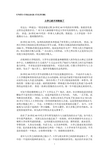
UNIT1 COLLEGE CULTURE大学已经不再特别了有这么一种说法:“要是你能记得20世纪60年代的任何事情,你就没有真正经历过那段岁月。
” 对于在大麻烟雾中度过大学时光的那些人,这话可能是真的。
但是,20世纪60年代有一件事人人都记得,那就是:上大学是你一生中最激动人心、最刺激的经历。
20世纪60年代,加州的高校把本州变成了世界第七大经济实体。
然而,加州大学的主校园伯克利分校也以学生示威、罢课以及激进的政治氛围而著名。
1966年,罗纳德•里根竞选加州州长,他问加州是否允许“一所伟大的大学被喧闹的、唱反调的少数人征服。
” 自由派人士回答说,大学之所以伟大正是因为它们有能力容忍喧闹的、唱反调的少数人。
在欧洲的大学校园里,大学生以新的姿态和激情投入到争取自由和正义的事业中去,大规模的社会主义或共产主义运动引发了他们与当权者之间日益升级的暴力冲突。
许多抗议是针对越南战争的。
可是在法国,巴黎大学的学生与工会联盟,发动了一场大罢工,最终导致戴高乐总统辞职。
20世纪60年代大学生活的特点并不仅仅是激进的行动。
不论在什么地方,上大学都意味着你初次品尝真正自由的滋味,初次品尝深更半夜在宿舍或学生活动室里讨论人生意义的滋味。
你往往得上了大学才能阅读你的第一本禁书,看你的第一部独立影人电影,或者找到和你一样痴迷吉米•亨德里克斯或兰尼•布鲁斯的志同道合者。
那是一段难以想象的自由时光,你一生中最无拘无束的时光。
可如今那份激情哪儿去了?大学怎么了?现在,政治、社会和创造意识的觉醒似乎不是凭借大学的助力,而是冲破其阻力才发生的。
当然,一点不假,高等教育仍然重要。
例如,在英国,布莱尔首相几乎实现了到2010年让50%的30岁以下的人上大学的目标(即使愤世嫉俗的人会说,这是要把他们排除在失业统计数据之外)。
不过,大学教育已不再是全民重视的话题了。
如今,大学被视为人们急于逃离的一种小城镇。
有些人辍学,但大多数已经有些麻木,还是坚持混到毕业,因为离开学校实在是太费事了。
新标准大学英语综合教程2 Unit 2 reading part2
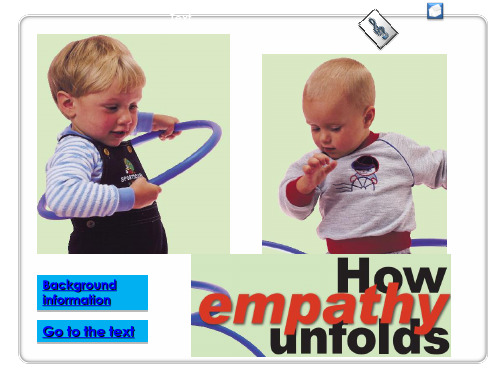
声援罢工,同情罢工
More
stroke
v. gently move your hand over, skin, hair, or fur (用手)轻
抚,抚摸
1.
Figure out the meaning of the underlined words. My dog likes being stroked.
out of / in sympathy with sympathy with/ for journalists with left-wing sympathies sympathy action = sympathy strike
支持左翼的新闻记者 吊唁卡 对···深表同情 ··· 赞同,支持
snslate the following sentences. He was sympathetic and charming.
他体贴入微;魅力四射。
He came across as sympathetic / a sympathetic person.
他给人以有同情心的印象。
More
sympathy
轻拍 奖励
It's safe to pat the dog on his back, but not on She received a pat on the back for doing a good
job.
赞扬
Back
sympathetic
adj. kind to someone who has a problem and willing to understand how thy feel
1.
2.
3.
4.
5.
I felt my flesh crawl as he described the murder. Can you swim a crawl? The way you crawl to them makes me sick. Traffic was slowed to a crawl. The weeks crawled by until we can meet again.
新标准大学英语第二册U2MixedFeelings讲稿
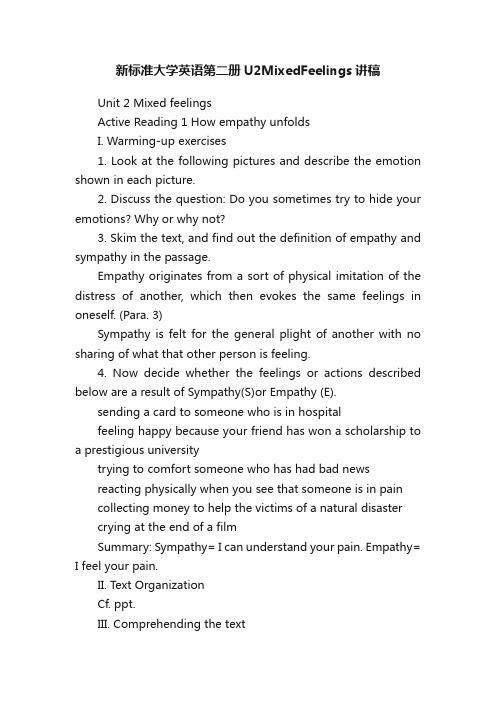
新标准大学英语第二册U2MixedFeelings讲稿Unit 2 Mixed feelingsActive Reading 1 How empathy unfoldsI. Warming-up exercises1. Look at the following pictures and describe the emotion shown in each picture.2. Discuss the question: Do you sometimes try to hide your emotions? Why or why not?3. Skim the text, and find out the definition of empathy and sympathy in the passage.Empathy originates from a sort of physical imitation of the distress of another, which then evokes the same feelings in oneself. (Para. 3)Sympathy is felt for the general plight of another with no sharing of what that other person is feeling.4. Now decide whether the feelings or actions described below are a result of Sympathy(S)or Empathy (E).sending a card to someone who is in hospitalfeeling happy because your friend has won a scholarship to a prestigious universitytrying to comfort someone who has had bad newsreacting physically when you see that someone is in paincollecting money to help the victims of a natural disastercrying at the end of a filmSummary: Sympathy= I can understand your pain. Empathy= I feel your pain.II. Text OrganizationCf. ppt.III. Comprehending the text1. What did Hope do when she saw another baby fall?Tears welled up in her own eyes and she crawled off to be comforted by her mother.2. Why did Michael give his teddy bear to Paul?He did it to comfort Paul.3. Who observed and recorded these actions?The babies? mothers observed and recorded these actions.4. When do psychologists believe that humans begin to experience empathy?They believe that humans begin to experience empathy virtually from the day they are born. 5. Which example shows that babies sometimes don?t realize they aren?t the ones who are suffering?The example of babies who imitate the distress of someone else.6. When was the word empathy first used in English to describe such reactions?The word empathy was first used in English in the 1920s byE. B. Titchener.7. Why was the word sympathy not appropriate?It is not appropriate because sympathy is felt for the general plight of another with no sharing of what that other person is feeling; empathy means actually sharing or imagining another person?s feelings.8. At what age do children start to distinguish other people?s feelings f rom their own?Around two and a half, children start to distinguish other people?s feelings from their own.9. How can parents increase feelings of empathy in their children?They can increase feelings of empathy in children by calling strong attention to the distress their misbehavior caused someone else.ⅣWords & Expressionsempathy n. [U] the ability to understand how someone feels because you can imagine what it is like to be them 同感;同情;移情empathy with/for sb./sth.empathy between A and Be.g. There is a strange empathy between the old lady and her grandson.老妇人和她孙子间有种莫名其妙的心灵相通的感觉。
Unit2新标准大学英语综合教程2

Text
By one year or so, they start to realize the misery is not their own but someone else's, though they still seem confused over what to do about it. In research by Martin L. Hoffman at New York University, for example, a one-year-old brought his own mother over to comfort a crying friend, ignoring the friend's mother, who was also in the room.
Text
2 Developmental psychologists have found that infants feel sympathetic distress even before they fully realize that they exist apart from other people. Even a few months after birth, infants react to a disturbance in those around them as though it were their own, crying when they see another child's tears.
Text
How Empathy Unfolds
1 The moment Hope, just nine months old, saw another baby fall, tears welled up in her own eyes and she crawled off to be comforted by her mother, as though it were she who had been hurt. And 15-month-old Michael went to get his own teddy bear for his crying friend Paul; when Paul kept crying, Michael retrieved Paul's security blanket for him.
整理新标准大学英语视听说Unit 2 Mixed feelings文本材料

《新标准大学英语视听说》本科课《新标准大学英语视听说》本科课程质量标准课程编号:__________________________课程名称:新标准大学英语视听说英文名称:NEW STANDARD COLLEGE ENGLISH总学时:_144_________________学分:_16学分________________________自主学习:_ 144总学时____________________适用对象:预防医学、临床医学、麻醉医学、医学影像学、医学检验、口腔医学、法医学、护理学、药学、药剂学、临床药学、卫生检疫学、社保、康复、法学、公管、医药营销、试光学。
课程考核:终结性考核,占总成绩60%形成性考核,占总成绩40%。
其中包括考勤(10%)、课堂表现及作业(10%)、自主学习(20%)《新标准大学英语视听说》《视听说教程》是《新标准大学英语》系列教材的主干教程之一,通过丰富多彩、真实生动的音视频材料与精心设计的听说活动,有效提高学生的英语听说能力,潜移默化地培养学生的文化意识、学习策略与创新思维。
原汁原味的视频、音频材料向学生展示鲜活地道的语言、真实生动的交际场景、丰富多彩的异域文化。
从专门录制的音像材料到来源多样的原版视频,从基本的发音训练、对话练习到不同形式的自由表达,听说活动难度与要求层级递进,既满足同一学生循序渐进训练口语的需求,又可满足不同层次和水平学生的要求。
翻开《视听说教程》,中外文化点滴俯首即拾,各国风土人情悉如亲如同游历各国,感受多元文化。
创新思维、独立思考、探索发现、协作交流等体现在各种活动中,有助于学生在学习语言的同时开拓视野,锻炼思维,培养自主学习与合作式学习能力。
CD-ROM助学光盘提供各单元视频与听力资源;网络课程根据主题内容设计,补充练习及丰富音频、视频资源。
教学管理平台功能全面、操作便捷,充分体现师生交互,全面保证教学管理。
视听说教程》包括1-4级,每级10个单元。
新标准大学英语综合教程2课件

04
Unit 4 English Speaking Skills
Chapter
Learning objectives
To improve students' English listening and speaking skills
To help students understand and use English in real situations
02
Unit 2 English Learning Strategy
Chapter
Learning objectives
To help learners understand the importance of English learning strategies
To develop learners' selflearning ability and independent thinking ability
differences of English
To improve learners' cross cultural communication ability and cultural adaptability
To promote cross cultural understanding and cultural exchange between China and foreign countries
Cultural awareness
To help students understand the culture and background of English speaking countries
To cultivate students' ability to understand and apply different cultures through reading, viewing, etc
U校园新标准大学英语(第二版)综合2Unit2MixedfeelingsUnittest

U校园新标准⼤学英语(第⼆版)综合2Unit2MixedfeelingsUnittest词汇与结构20题Directions:Choose the best word to complete each sentence.1)The school management encourages ____ involvement in the running of the school.A. crucialB. principalC. identicalD. parental参考答案:1) D∧收起答案2)Debbie is very ____ to the plight of homeless people and always gets very emotional when she sees them on the street.A. sympatheticB. objectiveC. subjectiveD. indifferent参考答案:2) A∧收起答案3)Certain types of birds often develop the skill of ____ and sound like they can speak.A. performanceB. personificationC. mimicryD. demonstration参考答案:3) C∧收起答案4)As babies develop, they need to learn to ____ before they can walk.A. crawlB. climbC. swimD. slide参考答案:4) A∧收起答案5)When he was a child, Tony lost all vision in his right eye, so he has ____ for the difficulties faced by blind people.A. apathyB. empathyC. emotionD. sympathy参考答案:5) B∧收起答案6)Kindergarten teachers often have to reprimand their students for ____.A. misbehaviorB. mimicryC. misunderstandingD. misery参考答案:6) A∧收起答案7)Often they cry, and I have to play the role of a mother, ____ them.A. consolingB. contractingC. strokingD. disciplining参考答案:7) A∧收起答案8)Babies usually cry when they feel ____ because they have no other way to express themselves.A. distressedB. dishonestC. distinguishedD. discouraged参考答案:8) A∧收起答案Everyone knows different cultures have different ways of ____ their children.A. sympathizingB. authorizingC. discipliningD. obeying参考答案:9) C∧收起答案10)It is _______ that she might change her mind at the last minute.A. availableB. inevitableC. probableD. accessible参考答案:10) C∧收起答案11)Thomas has no ____ to the feelings of others — he always makes very negative and offensive comments.A. sensationB. senseC. sensibilityD. sensitivity参考答案:There is nothing like a long walk to ____ the appetite.A. arouseB. engageC. digestD. absorb参考答案:12) A∧收起答案13)He reached out and ____ her hair tenderly.A. scratchedB. strokedC. wipedD. massaged参考答案:13) B∧收起答案14)Brian felt incredible pressure and made a ____ decision, which ultimately turned out to be a big mistake.A. hastyB. speedyC. swift∧收起答案15)He decided to ____ the rest of his life to scientific investigation.A. allocateB. submitC. exploreD. devote参考答案:15) D∧收起答案16)My brother was ____ interested in taking that psychology class at school.A. keenlyB. excitedlyC. eagerlyD. impatiently参考答案:16) A∧收起答案17)He ____ that plants draw part of their nourishment from the air.A. comparedB. inquired参考答案:17) D∧收起答案18)Her little sister is still just a(n) ____; she turns six months next week.A. toddlerB. infantC. dollD. adolescent参考答案:18) B∧收起答案19)Children love to ____ the actions they see in others, so be careful what you do!A. irritateB. imitateC. implicateD. instigate参考答案:19) B∧收起答案20)The photographs ____ strong memories of our holidays in France.A. evokedD. imitated参考答案:20) A∧收起答案单词填空10题Directions:Complete each sentence with a suitable preposition or adverb.∧收起答案∧收起答案∧收起答案24)∧收起答案∧收起答案∧收起答案∧收起答案∧收起答案29)∧收起答案选词填空(15选10)10题Directions:Read the following passage, and select a suitable word for each blank from the word bank. Write down the corresponding letter for each item in the blank. Each word can be used only once.A) unfoldB) retrieveC) traceD) disturbanceE) comprehendF) distinctG) repertoireH) divergeI) naughtyJ) catalogK) gushL) mostlyM) guyN) couchO) volumeLast summer, Derek completed a research project for his psychology thesis.back to its source. Derek took children of different ages and put them in a(n) 32)He then presented them with different stimuli that they might encounter duringadjust the lighting to be very bright or very dim; or fill the room with differentto the changing environment. Nearly all children eventually displayed someThe reactions were all fascinating, and Derek recorded everything thatthe implications for child behaviour. Hopefully, his work will help clarify and identify potential sources of misbehaviour.参考答案:31) trace 32) mostly 33) couch 34) volume 35) repertoire 36 ) distinct 37) unfold 38) naughty 39) disturbance 40) comprehe nd∧收起答案仔细阅读5题Directions:Read the passage and answer the following questions.Until very recently, most people assumed that the ability to feel and exhibit emotions was limited to human beings. It was generally assumed that animals could simply not feel emotions such as happiness, sadness, jealousy, anger, or grief. It wasn't that the intensity of these emotions was more limited than in humans; the general consensus was that such emotions were literally absent in all other animals.However, such thinking has recently been called into question as more and more researchers are uncovering evidence that suggests animals do indeed feel emotions. In some cases, these emotions are very obvious! Dog owners have known this for a long time. If a dog does something bad and is reprimanded by its owner, it will often hang its head low and exhibit "puppy-dog eyes." The dog knows it has been naughty and this is, in effect, its exhibition of sadness and sorrow.Another relatively clear example of animals' emotional behaviour is when they show aggression. In some cases, it doesn't take very much for animals to become irritated and angry. Dogs, wolves, lions, tigers, birds — nearly everyanimal has been observed in an agitated state and acting out against the cause of its frustration. In fact, animal researchers have even witnessed animals in the wild waging war and exacting revenge.Biologists have reported on countless other examples of animals' emotional behaviour. For example, some animals grieve over deceased family members, some dream and have nightmares, some display pride in the work demanded of them, some exhibit friendship and cooperation, and many show love. Examples of compassion and self-indulged enjoyment are also not uncommon.Based on the biological and scientific evidence, it seems beyond doubt that animals are capable of feeling and showing a wide range of emotions. Human do not have a monopoly on such feelings, and it's time for more people to understand that we're all part of one big emotional family.41)According to the article, which of the following was a general assumption made throughout much of history?A. Animals feel a wide range of emotions.B. People feel a wide range of emotions.C. Animals are incapable of feeling emotions.D. People feel a limited range of emotions.42)This style of writing would best be described as _______.A. narrativeB. argumentativeC. descriptiveD. expository43)Which of the following would make the best title for this article?A. The Limited Emotional Lives of AnimalsB. Animals are People TooC. A Monopoly on Emotional BehaviourD. Emotions are Universal44)What is meant by "puppy-dog eyes" (Para 2)?A. Eyes that are full of emotion.B. Eyes that belong to a puppy.C. Eyes that show no emotion.D. Eyes that look like a puppy's.45)Which of the following does the author NOT present in order to support the topic?A. Biological research.B. Popular opinion.C. Scientific evidence.D. Personal opinion.参考答案:41) C 42) B 43) D 44) A 45) D ∧收起答案。
新标准大学英语第二版综合教程2 Unit 2 B篇练习答案及课文翻译
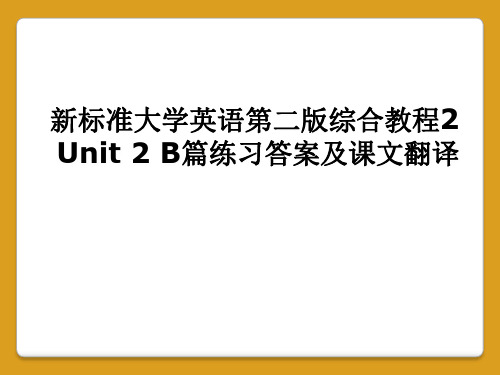
to a prestigious university e 3. trying to comfort someone who has had bad news. s 4. reacting physically when you see that someone is in pain
Text
How empathy unfolds
1 The moment Hope, just nine months old, saw another baby fall, tears welled up in her own eyes and she crawled off to be comforted by her mother, as though it were she who had been hurt. And 15-month-old Michael went to get his own teddy bear for his crying friend Paul; when Paul kept crying, Michael retrieved Paul’s security blanket for him. Both these small acts of sympathy and caring were observed by mothers trained to record such incidents of empathy in action. The results of the study suggest that the roots of empathy can be traced to infancy. Virtually from the day they are born infants are upset when they hear another infant crying – a response some see as the earliest precursor of empathy.
新标准大学英语综合教程2课件ppt
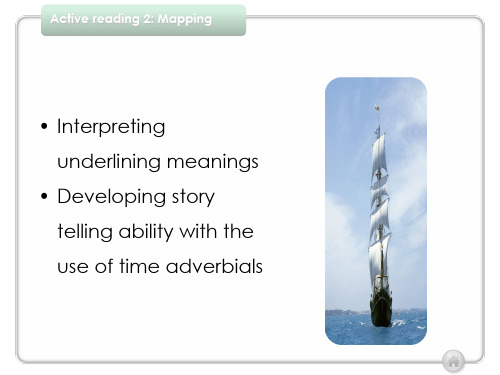
•病原体侵 入机体 ,消弱 机体防 御机能 ,破坏 机体内 环境的 相对稳 定性, 且在一 定部位 生长繁 殖,引 起不同 程度的 病理生 理过程
Active reading 2: embarkation
Making prediction
Read the first and last lines of each paragraphs and decide whether the statement is true or false.
Destination index
Summarising
Inventing stories
•病原体侵 入机体 ,消弱 机体防 御机能 ,破坏 机体内 环境的 相对稳 定性, 且在一 定部位 生长繁 殖,引 起不同 程度的 病理生 理过程
Active reading 2 :Destination
Summarising
Situation 2: introduce yourself to a new person online
Situation 3: sell yourself at a job interview
Situation 4: introduce yourself to a family friend (older generation)
•病原体侵 入机体 ,消弱 机体防 御机能 ,破坏 机体内 环境的 相对稳 定性, 且在一 定部位 生长繁 殖,引 起不同 程度的 病理生 理过程
Active reading 2: Mapping
• Interpreting underlining meanings
• Developing story telling ability with the use of time adverbials
【新标准大学英语-综合教程2】02-1教师版1
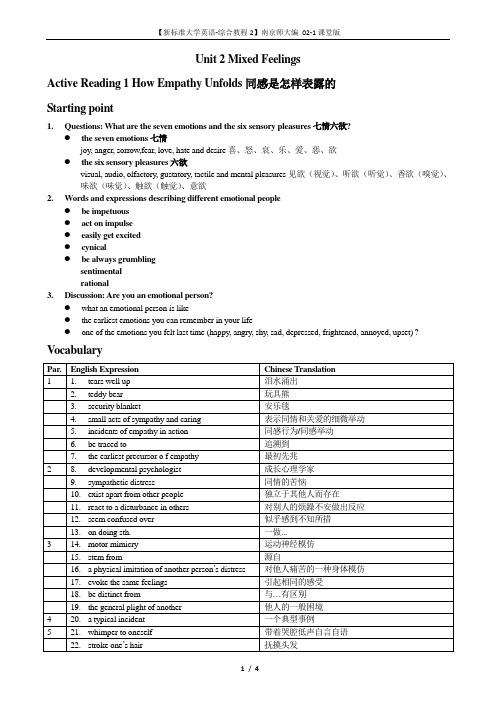
Unit 2 Mixed FeelingsActive Reading 1 How Empathy Unfolds同感是怎样表露的Starting point1.Questions: What are the seven emotions and the six sensory pleasures七情六欲?●the seven emotions七情joy, anger, sorrow,fear, love, hate and desire喜、怒、哀、乐、爱、恶、欲●the six sensory pleasures六欲visual, audio, olfactory, gustatory, tactile and mental pleasures见欲(视觉)、听欲(听觉)、香欲(嗅觉)、味欲(味觉)、触欲(触觉)、意欲2.Words and expressions describing different emotional people●be impetuous●act on impulse●easily get excited●cynical●be always grumblingsentimentalrational3.Discussion: Are you an emotional person?●what an emotional person is like●the earliest emotions you can remember in your life●one of the emotions you felt last time (happy, angry, shy, sad, depressed, frightened, annoyed, upset) ? Vocabularyempathy, apathy, antipathy, sympathy, pathos1.empathyn. the ability to understand other people's feelings and problems; the ability to share another person's feelings and emotions as if they were your own.have empathy with/for sb.Having begun my life in a children's home I have great empathy with the little ones.2.sympathy3.antipathya feeling of strong dislike towards someone or something synonym hostilityantipathy to/towards▪ a growing antipathy towards the government4.pathos n.the quality that a person, situation, film, or play has that makes you feel pity and sadness; aquality, as of anexperience or a work of art, that arouses feelings of pity, sympathy, tenderness, or sorrow(演讲、文章中的)怜悯,同情,哀婉,凄楚▪ the pathos of the woman trying to keep her lover5.apathythe feeling of not being interested in something, and not willing to make any effort to change or improve things: ▪ The campaign failed because of public apathy.infancydisturbancetraceTo follow the course or trail of:跟踪:跟随…的道路或足迹:trace a wounded deer; tracing missing persons.跟踪一头受伤的鹿;追寻失踪者To ascertain the successive stages in the development or progress of:追溯,探索:确定在…的发展或进程中的各个连续阶段:tracing the life cycle of an insect; trace the history of a family.探索一昆虫的生命周期;追溯一家族的历史To locate or discover by searching or researching evidence:查出:通过寻找或研究证据确定或发现:trace the cause of a disease.查出一疾病的原因dateTo have origin in a particular time in the past:源自:有过去特定时间的起源:This statue dates from 500b.c. 这座雕像可以追溯到公元前500年evokeTo call to mind by naming, citing, or suggesting:使人想起,使人产生:通过名字、引用或暗示使想起…:songs that evoke old memories.divergeTo differ, as in opinion or manner.分歧,相异,如在观点或行为上disciplineTo train by instruction and practice, especially to teach self-control to.训练,调教:通过教学和实践训练,尤指学会自我克制To teach to obey rules or accept authority.See Synonyms at teach 使遵守准则,使服从权威参见teachTo punish in order to gain control or enforce obedience.See Synonyms at punish 惩罚,处罚:为了控制或胁迫他人遵从而惩罚参见punishstem fromTo have or take origin or descent.起源于:由…发生,起源或源于Correct decisions stem from correct judgements.正确的决心来源于正确的判断。
新标准大学英语第二册U2MixedFeelings讲稿5则范文

新标准大学英语第二册U2MixedFeelings讲稿5则范文第一篇:新标准大学英语第二册U2 Mixed Feelings讲稿Unit 2 Mixed feelingsActive Reading 1 How empathy unfoldsI.Warming-up exercises 1.Look at the following pictures and describe the emotion shown in each picture.2.Discuss the question: Do you sometimes try to hide your emotions? Why or why not? 3.Skim the text, and find out the definition of empathy and sympathy in the passage.Empathy originates from a sort of physical imitation of the distress of another, which then evokes the same feelings in oneself.(Para.3)Sympathy is felt for the general plight of another with no sharing of what that other person is feeling.4.Now decide whether the feelings or actions described below are a result of Sympathy(S)or Empathy(E).sending a card to someone who is in hospital feeling happy because your friend has won a scholarship to a prestigious university trying to comfort someone who has had bad news reacting physically when you see that someone is in pain collecting money to help the victims of a natural disaster crying at the end of a film Summary: Sympathy= I can understand your pain.Empathy= I feel your pain.II.Text Organization prehending the text 1.What did Hope do when she saw another baby fall?Tears welled up in her own eyes and she crawled off to be comforted by her mother.2.Why did Michael give his teddy bear to Paul?He did it to comfort Paul.3.Who observed and recorded these actions?The babies‟mothers observed and recorded theseactions.4.When do psychologists believe that humans begin to experience empathy?They believe that humans begin to experience empathy virtually from the day they are born.5.Which example shows that babies sometimes don‟t realize they aren‟t the ones who are suffering?The example of babies who imitate the distress of someone else.6.When was the word empathy first used in English to describe such reactions?The word empathy was first used in English in the 1920s by E.B.Titchener.7.Why was the word sympathy not appropriate?It is not appropriate because sympathy is felt for the general plight of another with no sharing of what that other person is feeling;empathy means actually sharing or imagining another person‟s feelings.8.At what age do children start to distinguish other people‟s feelings from their own?Around two and a half, children start to distinguish other people‟s feelings from their own.9.How can parents increase feelings of empathy in their children?They can increase feelings of empathy in children by calling strong attention to the distress their misbehavior caused someone else.Ⅳ Words & Expressions empathy n.[U] the ability to understand how someone feels because you can imagine what it is like to be them 同感;同情;移情empathy with/for sb./sth.empathy between A and B e.g.There is a strange empathy between the old lady and her grandson.老妇人和她孙子间有种莫名其妙的心灵相通的感觉。
全新版大学英语综合教程第二册第2单元课文讲解

全新版大学英语综合教程第二册第2单元课文讲解全新版大学英语综合教程第二册第2单元课文讲解导语:每个人的价值观念有所不同,但是物体的价值却是相似的,下面是一篇关于价值的英语课文,欢迎大家来学习。
ValuesPart I Pre-Reading TaskListen to the recording two or three times and then think over the following questions:1. Who is it about?2. What happened to him one day?3. Do you think it was worthwhile to walk two or three miles to pay back the six and a quarter cents?4. Is the story related to the theme of the unit — values?The following words in the recording may be new to you:dismayn. 沮丧,失望disturbvt. 使不安conscientiousa. 认真的,尽职的Part IITextDoes being rich mean you live a completely different life from ordinary people? Not, it seems, if your name is Sam Walton.THE RICHEST MAN IN AMERICA, DOWN HOMEArt HarrisHe put on a dinner jacket to serve as a waiter at the birthday party of The Richest Man in America. He imagined what surely awaited: a mansion, a "Rolls-Royce for every day of the week,"dogs with diamond collars, servants everywhere.Then he was off to the house, wheeling past the sleepy town square in Bentonville, a remote Arkansas town of 9,920, where Sam Walton started with a little dime store that grew into a $6 billion discount chain called Wal-Mart. He drove down a country road, turned at a mailbox marked "Sam and Helen Walton," and jumped out at a house in the woods.It was nice, but no palace. The furniture appeared a little worn. An old pickup truck sat in the garage and a muddy bird dog ran about the yard. He never spotted any servants."It was a real disappointment," sighs waiter Jamie Beaulieu.Only in America can a billionaire carry on like plain folks and get away with it. And the 67-year-old discount king Sam Moore Walton still travels these windy back roads in his 1979 Ford pickup, red and white, bird dogs by his side, and, come shooting season, waits in line like everyone else to buy shells at the local Wal-Mart."He doesn't want any special treatment," says night manager Johnny Baker, who struggles to call the boss by his first name as a recent corporate memo commands. Few here think of his billions; they call him "Mr. Sam" and accept his folksy ways. "He's the same man who opened his dime store on the square and worked 18 hours a day for his dream," says Mayor Richard Hoback.By all accounts, he's friendly, cheerful, a fine neighbor who does his best to blend in, never flashy, never throwing his weight around.No matter how big a time he had on Saturday night, you can find him in church on Sunday. Surely in a reserved seat, right? "We don't have reserved seats," says Gordon Garlington III,pastor of the local church.So where does The Richest Man in America sit? Wherever he finds a seat. "Look, he's just not that way. He doesn't have a set place. At a church supper the other night, he and his wife were in back washing dishes."For 19 years, he's used the same barber. John Mayhall finds him waiting when he opens up at 7 a.m. He chats about the national news, or reads in his chair, perhaps the Benton County Daily Democrat, another Walton property that keeps him off the front page. It buried the Forbes list at the bottom of page 2."He's just not a front-page person," a newspaper employee explains.But one recent morning, The Richest Man in America did something that would have made headlines any where in the world: He forgot his money. "I said, 'Forget it, take care of it next time,'" says barber Mayhall. "But he said, 'No, I'll get it,' and he went home for his wallet."Wasn't that, well, a little strange? "No sir," says Mayhall, "the only thing strange about Sam Walton is that he isn't strange."But just how long Walton can hold firm to his folksy habits with celebrity hunters keeping following him wherever he goes is anyone's guess. Ever since Forbes magazine pronounced him America's richest man, with $2.8 billion in Wal-Mart stock, he's been a rich man on the run, steering clear of reporters, dreamers, and schemers."He may be the richest by Forbes rankings," says corporate affairs director Jim Von Gremp, "but he doesn't know whether he is or not — and he doesn't care. He doesn't spend much. He owns stock, but he's always left it in the company so it could grow. But the real story in his mind is the success achieved by the 100,000people who make up the Wal-Mart team."He's usually back home for Friday sales meetings, or the executive pep rally Saturday morning at 7 a.m., when Walton, as he does at new store openings, is liable to jump up on a chair and lead everyone in the Wal-Mart cheer: "Give me a W! Give me an A! Give me an L! Louder!"And louder they yell. No one admits to feeling the least bit silly. It's all part of the Wal-Mart way of life as laid down by Sam: loyalty, hard work, long hours; get ideas into the system from the bottom up, Japanese-style; treat your people right; cut prices and margins to the bone and sleep well at night. Employees with one year on board qualify for stock options, and are urged to buy all they can.After the pep rally, there's bird hunting, or tennis on his backyard court. But his stores are always on his mind. One tennis guest managed to put him off his game by asking why a can of balls cost more in one Wal-Mart than another. It turned out to be untrue, but the move worked. Walton lost four straight games.Walton set up a college scholarship fund for employees' children, a disaster relief fund to rebuild employee homes damaged by fires, floods, tornadoes, and the like. He believed in cultivating ideas and rewarding success."He'd say, 'That fellow worked hard, let's give him a little extra,'" recalls retired president Ferold F. Arend, who was stunned at such generosity after the stingy employer he left to join Wal-Mart. "I had to change my way of thinking when I came aboard.""The reason for our success," says Walton, in a company handout, "is our people and the way they're treated and the way they feel about their company. They believe things are different here, but they deserve the credit."Adds company lawyer Jim Hendren: "I've never seen anyone yet who worked for him or was around him for any length of time who wasn't better off. And I don't mean just financially, although a lot of people are. It's just something about him — coming into contact with Sam Walton just makes you a better person." New Words and Expressionsmansion▲n. a large house, usu. belonging to a rich person (豪华的)宅邸,大厦remotea. far away in space or time 遥远的dimen. (美国、加拿大的)10分硬币billionnum.(美、法)十亿;(英、德)万亿discountn. amount of money which may be taken off the full price 折扣pickupn. a light van having an open body with low sides 小卡车,轻型货车muddy▲a. covered in mud 沾满泥的;泥泞的sighvi. 叹气,叹息billionairen. 亿万富翁;大富翁carry onbehave in a wild or improper way; conduct; continue 举止随便;进行;继续做folkn. (usu.pl) people in general 人们;人民get away withdo (sth.) without being caught or punished 做(某事)而未被发觉或未受惩罚shelln. (AmE) 枪弹;炮弹;壳locala. of a particular place 地方的,当地的treatmentn. 对待;待遇corporate▲a. 公司的memo▲n. a note of sth. to be remembered 备忘录folksya. simple and friendly 友好的',坦率的mayorn. 市长by/from all accountsaccording to what everyone says 人人都说cheerfula. (of a person) happy in a lively way; (of sth.) making one feel happy 愉快的;令人愉快的blendv. mix together thoroughly (将…)混合blend inmix harmoniously 融洽,十分协调flashya. attracting attention by being too smart and decorated 浮华的,华而不实的throw one's weight around(infml) 盛气凌人reservevt. keep for a special use; book (a seat, room, table, etc.) 将…留作专用;预定pastorn. 牧师barbern. 理发师open up(infml) 开门;打开democratn. 民主党人;民主主义者employeen. 雇员,受雇者headlinen. (报纸上的)标题wallet▲n. 皮夹子hold tokeep to 遵守,不改变celebrityn. famous person 名人stockn. 资本;股票,证券on the runin flight; continuously active 奔逃,逃避;忙个不停steerv. 驾驶steer clear ofkeep away from 避开,避免reportern. 记者schemern. 阴谋家schemen. 阴谋;计划rankingn. 地位;等级rankv. (将…)列为(某等级)make upform, constitute 构成,组成executiven., a. 经营管理方面的(人员);行政方面的(人员)pepn. (infml) keen activity and energy 劲头,活力rallyn., v. 集会pep rallya gathering intended to encourage the listeners 鼓舞士气的会议openingn. the act of becoming or making open, esp. officially (正式的)开张,开幕liablea. likely (to do sht.) 有可能做…的yell▲v. shout loudly 喊叫lay downestablish 制定;设立loyaltyn. being true and faithful (to) 忠诚systemn. 系统qualifyv. (使)具有资格optionn. 期权,购买(或出售)权;选择自由stock option优先认股权courtn. 球场scholarshipn. 奖学金tornadon. 龙卷风cultivatevt. improve by care, training or study; develop 培养,陶冶rewardv. give (sth.) to sb. in return for work or services 奖赏retireda. (of a person) having stopped working, usu. because of age 退休了的retirev. (使)退休stun▲vt. make (sb.) very surprised 使惊吓generosityn. the quality of being willing to give money, help, etc. 慷慨,大方stingya. unwilling to spend money 吝啬的employern. 雇佣者,雇主aboardadv., prep. on or into (a ship, train, aircraft, bus, etc.) 在(船、车、飞机等)上come aboard(fig) become a new member of an organization 入伙,加盟handoutn. information given out in the form of a printed sheet, leaflet 印刷品,宣传品deservevt. be worthy of 应受,值得Proper NamesArt Harris阿特·哈里斯Rolls-Royce罗尔斯-罗伊斯汽车Bentonville本顿维尔(美国地名)Arkansas(美国)阿肯色州Sam Moore Walton萨姆·穆尔·沃尔顿Wal-Mart沃尔玛公司Jamie Beaulieu杰米·鲍尤Ford福特汽车Johnny Baker乔尼·贝克Richard Hoback理查德·霍巴克Gordon Garlington III戈登·加林顿第三Mayhall梅霍Benton County本顿县(美国地名)Forbes福布斯(杂志名)Jim Von Gremp吉姆·冯·格雷姆普Ferold F·Arend费罗尔德·F·阿伦德Jim Hendren吉姆·亨德伦Language Sense Enhancement1. Read aloud paragraphs 19-22 and learn them by heart.2. Read aloud the following poem:I'm nobody! Who are you?Emily DickinsonI'm nobody! Who are you?Are you nobody, too?Then there's a pair of us — don't tell!They'd advertise — you Know!How dreary to be somebody!How public like a frogTo tell one's name the livelong dayTo an admiring bog!3. Read the following quotations. Learn them by heart if you can. You might need to look up new words in a dictionary.One should eat to live, not live to eat.—— Benjamin FranklinThat man is the richest whose pleasures are the cheapest.—— Henry David ThoreauIf money is your hope for independence you will never have it. The only real security that a man will have in this world is a reserve of knowledge, experience, and ability.—— Henry FordTo travel hopefully is a better thing than to arrive, and the true success is to labor.—— Robert Louis Stevenson4. Read the following humorous story for fun. You might need to look up new words in a dictionary.The elderly gamekeeper of a Scottish estate suffered from fading eyesight, and the lord of the manor offered to send him to London to see an eye specialist. Before he left, however, he was given strict instructions to spend his money thriftily and to live as he would at home.When the keeper returned a week later, he presented the lord with a bill for more than £1000. Shocked, the lord asked what he had been living on in London."Oh, the usual, sir," came the reply. "Pheasant, salmon, grouse and venison."。
大学英语第二册第五单元(B2-U5)讲稿
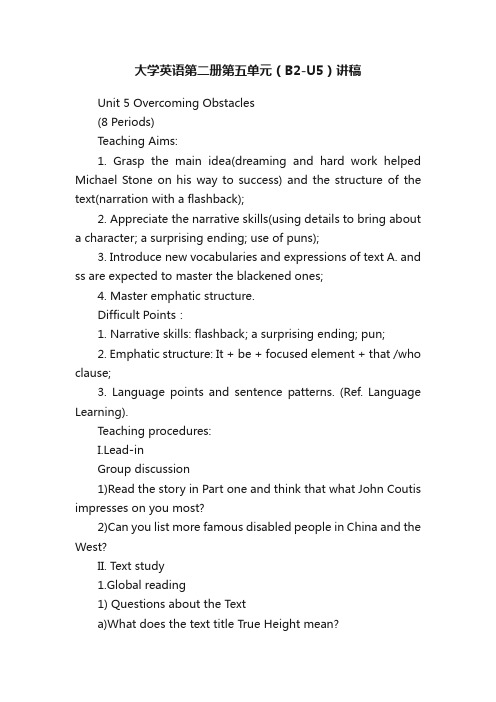
大学英语第二册第五单元(B2-U5)讲稿Unit 5 Overcoming Obstacles(8 Periods)Teaching Aims:1. Grasp the main idea(dreaming and hard work helped Michael Stone on his way to success) and the structure of the text(narration with a flashback);2. Appreciate the narrative skills(using details to bring abouta character; a surprising ending; use of puns);3. Introduce new vocabularies and expressions of text A. and ss are expected to master the blackened ones;4. Master emphatic structure.Difficult Points:1. Narrative skills: flashback; a surprising ending; pun;2. Emphatic structure: It + be + focused element + that /who clause;3. Language points and sentence patterns. (Ref. Language Learning).Teaching procedures:I.Lead-inGroup discussion1)Read the story in Part one and think that what John Coutis impresses on you most?2)Can you list more famous disabled people in China and the West?II. Text study1.Global reading1) Questions about the Texta)What does the text title True Height mean?(=It has more than one meaning. They are:1) the new bar heights that Michael cleared one after another.2) the tremendous obstacles Michael had overcome in attaining his goal.)b) As the text consists of the main story and a flashback, can you figure out the flashback(=The flashback is from line 11 to line 35)2) Scan the whole text to find out all the words and phrases that are related to sports or stadium. And think about their Chinese equivalents.National Junior Olympics 全国少年奥林匹克运动会personal best 个人最高记录stand(s) 看台final race 赛跑决赛pole vault event 撑竿跳高项目track and field competition 田径比赛gymnast 体操运动员body builder 健美运动员weightlifting 举重bar 横杆inflated landing mat 充气垫vaulter 撑竿跳高运动员finger-tipped push-up 俯卧撑runway 跑道National record 全国记录pole 撑竿take-off 起跳set a new world record 刷新一项世界纪录2.Detailed reading1)Questions and answersWho is talked about in part one? What does he do?Can you use one word to describe Michael’ s mother and father respectively?How did Michael feel about his successful attempt at beating his personal best by three inches?At what moment did Michael begin to feel nervous?What helped Michael overcome his nervousness?What made Michael associate his final jump with his childhood dream?How did Michael think his parents might feel about his success? And what was his father’s reaction to his feat?Why would Michael attract a lot of media attention?2) Difficult Sentencesa)(LL. 8~9) It combines the grace of a gymnast with the strength of a body builder.Translate the sentence into Chinese.(=它融合了体操运动员的优雅与健美运动员的力量。
新标准大学英语视听说unit 2 mied feelings文本材料

Unit 2 Mixed feelingsInside viewConversation1Kate :Come in. Hey, Janet.Janet :Hi Kate, are you busyKate :Yes, I’m just doing an essay. But it’s great to see you. So what’s newJanet :Well, nothing much.Kate :You look a bit fed up. What’s bugging you Janet :Well, I had a phone call from my parents and it made me feel homesick. It happens everytime they call, and it gets me down.Kate :I’m sorry to hear that. I know how you feel.I love speaking to my mum and dad, but Ialways feel miserable after the call.Janet :My dad doesn’t say much, and I want to speak to him, but I wish I knew what to say.Kate :Don’t let it get to you. My dad doesn’t say much on the phone either. I call, he answersthe phone, and says, “Hi, I’ll pass you to your mo ther.” It’s really irritating.Janet :But I miss him and my mother a lot, and I like to hear his voice.Kate :Just tell him what you’re up to.Janet :Sometimes I feel as if I made a mistake leaving home and coming to Oxford.Sometimes I feel like a moody teenager.Kate :Try not to worry about it, Janet. It’s normal to feel like that. I understand how you feel, butI bet everything will be fine next term. You’ll get used to it. Hey, why don’t you do what I doJanet :What’s thatKate :When my dad calls, I ask him for more money! He usually says no, but at least I getto hear his voice!Janet :Maybe. I’m sorry to take up your time, Kate, but I must go now. Bye!Kate :Wait a minute …!Conversation2Kate :I think I may have upset Janet last night. Mark :What happenedKate :She came to see me. I was busy doing an essay but I was really pleased to see her. She’d had a call from home, and said she was feeling homesick.Mark :Poor kid! It must be tough on you guys, living so far away from home.Kate :I tried to make her laugh, told her not to worry about it, and that it was normal to feel miserable. Suddenly she looked miserable, and then she got up and said, “I must go now” and left my room. It was really sudden. I felt as if I’d said something wrong. Mark :Maybe she was just being polite. It was probably because she realized you were working and didn’t want to disturb you.Kate :I just wonder if she found it difficult to talk about her feelings with me. Maybe I shouldn’thave tried to make her laugh Perhaps she thought I wasn’t taking her seriously.Mark :I wouldn’t worry about it. Put yourself in her shoes. How would you feel if you were a student at college in ChinaKate :I know. That’s why I feel bad. If only she had stayed longer! I wish I could have helped her more.Janet :Hey, everyone!Mark :Hi Janet, you look cheerful!Janet :Yes, I’ve just got my essay back. I got an alpha minus!Kate :What an amazing grade! Well done.Mark :I’m really happy for you, Janet.Janet :I feel on top of the world!Outside viewSebastienHi. I’m Sebastien. I’m from Germany. Um, the idea of IQ of a measure of your brain power has been around for a while, but recently there’s been this new idea of the EQ –your emotional quotient. And by now, it’s actually almost being regarded as more important. If you look at it, businesses will … Well, they will prefer employing people with great EQ. Well, of course, IQ cannot be disregarded, but um, EQ does have its importance as well. Uh, I believe that, um, … I mean, people, most people will have, um, their basic means of communicating with other people. Most people aresomewhat socially adept, and just like most people have, you know, a basic general knowledge. But then, what I think really is the difference betweenIQ and EQ, I mean, you can have a “brainiac”, and they will be great at most things they do, but if you just can’t get along with him, if you just can’t communicate with him, I mean, you know, he’s not really that useful.KimHi. This is Kim. I’m orig inally from Korea, and I was raised in California. And today, we are going to talk about the differences between IQ and EQ – IQ meaning your intelligence, EQ meaning your emotions. Now, in … When I was, when I was a little, little boy in Korea, I had to ta ke … I think I’d taken like two or three IQ tests before the age of ten, which is when I moved to California. So, I guess we stress a lot of importance on intelligence, on having great IQ scores. But after I moved to the States, I learnt how to associate with people, and along the lines that this word EQ came up, you know, emotional, caring about … It’s basicallyhow you deal with people, howyou make people feel, and how people make you feel.I think they’re equally as, as important, but it seems that in the Eastern world they kind of stress on that a lot more back in the days. But I think again, you know, now that with Internet and people are communicating so much faster, there’s a better mixture of the two I think. There’s a stress on EQ in Korea as w ell, and a stress on IQ in the States. Thank you.TedHello. My name is Ted, and I’m from the United States of America. Today, I’m going to talk a little bit about IQ or EQ – which is most important, or which is more important. Now, for a long time when I was growing up, people said, “IQ. What’s your IQ Take an IQ test.” But then EQ, your emotions, how you interact with people, that became very important. And I think they’re … that people might be onto something with that, because your EQ – how you deal with people, how you interact withpeople – is important. Now, a big part of this, in my opinion, is listening. I know I’m talking a lot right now, but if you want to get along well with people, you have to listen to them, so just take a minute, maybe shut your mouth for a minute, and listen to others, and then you can understand and communicate with them in a better way. So, part of EQ, I think, is listening –listening to others –and it can be more important than IQ.Listening inPassage1PresenterWe’re fortunate to have as our guest today Dr Jenna Hudson, who has just written a book about how colours affect us in our surroundings, especially in the world of advertising. It’s called Market Colours. Dr Hudson, which are the most common colours in advertising and marketingDr HudsonWell, of course, it depends what image the marketingteam wish to project with their products. So for example, we often think of blue as a cold colour, but it also makes you feel peaceful, quiet, and it doesn’t suggest s trong emotions. So it’s a favourite for banks and insurance companies, who wish to suggest the image that they are trustworthy. And for selling products, it’s often used tosuggest something is pure and fresh.What about redYou can sell almost anything with red. It’s a hot colour, which suggests a feeling of energy and even passion. It grabs your attention, and can make people buy almost anything. You often see red on magazine covers. But if you use it too much, it looks cheap and may make people tired. And orange has a similar effect to red, it’s upbeat and happy, it suggests pleasant feelings and images. Most people react well to orange, and it’s especially popular in advertising and on packaging for baked food.What about yellow, for instanceYellow is the colour of sunshine and it’s a positive, happy colour, so it’s used a lot in advertising. Butit’s also often used for warning signs, direction signs, and so on, where you have to read the message quickly and at a distance.What about less popular colours for advertising Surprisingly, green isn’t used much in advertising except for garden products. It’s friendly and restful. It can be cool and soothing, the colour of apples and mint, but it can also be quite strong and many people associate it with unpleasant ideas of decay or slimy creatures. But most colours are not primary colours, they’re a combination. Absolutely. So yellow-orange is common, and often used to give animpression of style and class, it looks like gold. But it’s not often used in l etters because it’s not very strong. And yellow-green reminds people of feeling sick.Blue-green works well as a cool colour, suggesting freshness, and is sometimesused for toothpaste products, bathroom products, food and household cleaning products. It has many of the advantages of blue without the disadvantages of green. you very much, DrScriptsHudson. Market Colours by Dr JennaHudson is on sale from next week,priced £…Passage2Presenter :What makes you embarrassed, SallySally :Oh, I’m easily embarrassed. If anybody notices me or looks at me, I get very embarrassed. When people sing me Happy Birthday on my birthday, I get very embarrassed.Presenter :And what makes you upsetSally :When people are selfish, people who think only of themselves. And cruelty – I can’t bear people who are cruel, especially to animals or children. Presenter :Jake, what makes you depressedJake :I hate it when it rains, and I don’t like people who look down on me, who think they’re superior to me without any reason.Presenter :And what makes you angryJake :When people don’t behave properly in public, bad behaviour like dropping litter or people pushing each other on the bus or the train.Presenter :Andrew, what makes you cheerfulAndrew :I like to see everyone around me being happy and having a positive attitude towards the future, optimistic people.Presenter :And what makes you jealousAndrew :Well, to be honest, I just never feel jealous.I can’t see the point of it.Presenter :Monica, what makes you proudMonica :I’m proud when I’m successful, especially in my work. Being recognized by my boss for what I can do makes me feel really proud. Oh, and my family. I’m very proud of them.Presenter :And what makes you nervousMonica :Every time I teach a new class. The night before I’m very nervous. You don’t know what the kids are going to be like and how they might behave, or if they’re going to like you.Presenter :Anything elseMonica :Doing interviews like this.。
新标准大学英语综合教程2课文总结
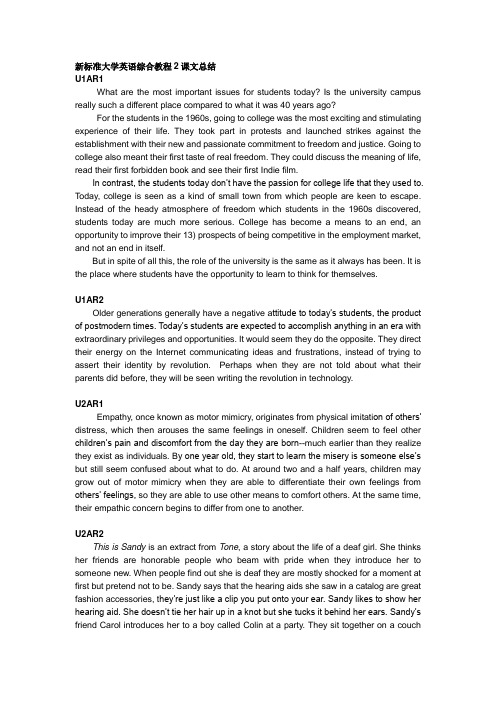
新标准大学英语综合教程2课文总结U1AR1What are the most important issues for students today? Is the university campus really such a different place compared to what it was 40 years ago?For the students in the 1960s, going to college was the most exciting and stimulating experience of their life. They took part in protests and launched strikes against the establishment with their new and passionate commitment to freedom and justice. Going to college also meant their first taste of real freedom. They could discuss the meaning of life, read their first forbidden book and see their first Indie film.In contrast, the students today don’t have the passion for college life that they used to. Today, college is seen as a kind of small town from which people are keen to escape. Instead of the heady atmosphere of freedom which students in the 1960s discovered, students today are much more serious. College has become a means to an end, an opportunity to improve their 13) prospects of being competitive in the employment market, and not an end in itself.But in spite of all this, the role of the university is the same as it always has been. It is the place where students have the opportunity to learn to think for themselves.U1AR2Older generations generally have a negative a ttitude to today’s students, the product of postmodern times. Today’s students are expected to accomplish anything in an era with extraordinary privileges and opportunities. It would seem they do the opposite. They direct their energy on the Internet communicating ideas and frustrations, instead of trying to assert their identity by revolution. Perhaps when they are not told about what their parents did before, they will be seen writing the revolution in technology.U2AR1Empathy, once known as motor mimicry, originates from physical imitati on of others’distress, which then arouses the same feelings in oneself. Children seem to feel other children’s pain and discomfort from the day they are born--much earlier than they realize they exist as individuals. B y one year old, they start to learn the misery is someone else’s but still seem confused about what to do. At around two and a half years, children may grow out of motor mimicry when they are able to differentiate their own feelings from others’ feelings, so they are able to use other means to comfort others. At the same time, their empathic concern begins to differ from one to another.U2AR2This is Sandy is an extract from Tone, a story about the life of a deaf girl. She thinks her friends are honorable people who beam with pride when they introduce her to someone new. When people find out she is deaf they are mostly shocked for a moment at first but pretend not to be. Sandy says that the hearing aids she saw in a catalog are great fashion accessories, t hey’re just like a clip you put onto your ear. Sandy likes to show her hearing aid. She doesn’t tie her hair up in a knot but she tucks it behind her ears. Sandy’s friend Carol introduces her to a boy called Colin at a party. They sit together on a couchand Colin realizes that Sandy can understand what he is saying by reading his lips. Someone turns up the volume of the music and they dance together. Soon they are dating. This is when the real drama begins.U3AR1Identity theft refers to stealing information about someone that makes it possible to use their bank account or credit card. With an informal and conversational tone the author persuades readers into actions against the threats of identity fraud in our daily life. According to the author we make t he thieves’ job easy by leaving our mails unprotected, using ball pens for checks and forms, throwing documents containing our personal information in the trash, leaving our computer on and so on.So we should look for different ways to protect ourselves and change our mindset.Identity crime is very likely to happen at any time, to any of us. We can take precautions to improve the chances of avoiding this crime, though it will never go away.U3AR2The writer tries to create a feeling of fear in order to warn readers of the threat involved in the ever-increasing amounts of data on people being collected. With various stylistic devices, the writer leads readers along his thought-path step by step to the point that collecting personal information places people in peril because we don’t know who collects it for what purposes. And neither do we know where the information goes and how it is used. According to the writer, identity theft is much feared in society, but there are worse things than that. And the danger is growing though it is vague, not certain. There is no balance yet between the convenience of the world and the peril that we sense in the presence of all that information in the databases which can be employed as a weapon as well as a tool.U5AR1As an anti-war novel, Catch-22 is well known for its comic tone as against the normal perception of a war novel which tends to be serious, sentimental and involve bloodshed. Its main character is Yossarian. Unlike the war heroes who would die for their home country, Yossarian aims to survive the war and go back home.To achieve this goal, he has to pretend to be insane. If he were crazy, he could be grounded. So he had to ask Doc Daneeka first. But once he asked Doc Daneeka, it meant he would no longer be crazy and would have to fly more missions. Normally, he was sane if he didn’t fly more missions while he would be crazy if he flew more missions. Anyway, he would be plunged into a tricky situation – a Catch-22 situation.U5AR2To escape from Nazi persecution of the Jews, Anne and her family members emigrated from Germany to Holland. However, in 1940 the Germans invaded, and occupied Holland. So quickly did the persecution of the Dutch Jews begin there that the Franks and another Jew family, the Van Pels went into hiding in the secret annexes. For the next two years, eight people of the two families were confined to just six small roomsand could never go outside.Under such harsh circumstances, Anne continued to write her diary, which she started a few weeks before they moved to the hiding. Her diary was the account of the day-to-day activity in the annex – the suffering, but her dreams and aspirations were still there. The diary voiced a declaration of her principles and of the right to human dignity so profoundly that it was viewed as the voice of Holocaust.In August 1944, the hiding place was stormed, and Nazi officers arrested everyone. They were taken to concentration camps. Out of the eight people in hiding, Otto Frank was the only survivors, and when he found his daughter’s diary after the war, he arranged for its publication in recognition of her courage. Anne’s writing would be a support and comfort to the world after her death.U7AR1On a cold, windy morning, I was hanging up the laundry in the backyard, while Hogahn was playing a two-foot oak branch that had fallen into his loving possession. Focused on capturing the sheet which was trying to sail off over the pond to join the sky so that it draped evenly over the line, I distractedly picked up the stick and tossed it down the hill toward the fence that separated the yard from the water.But the stick went further than I expected and fell into the pond. So did Hogahn, who raced to catch the stick. I was penetratingly aware of the dangers of drowning in the icy pond, but I still walked into it to save the dog. After I carried him out of the water and rubbed him with a towel, Hogahn went over and examined my wet clothes on the floor. He was pleased that we had shared a dramatic experience together.U7AR2Animals used to be compared to machines programmed to react to stimuli. They were not considered capable of feeling or thinking and certainly not of understanding abstract concepts. However, new studies have shown that intelligence is not limited to us human beings as well as species with whom we have a common ancestor. Elephants can recognize themselves in a mirror and birds can understand many concepts. Scientists now believe that intelligence evolves to suit the environment in the same way that bodies do. As a result, they suggest that we should reconsider the way we treat animals.U8AR1In the book Painting as a Pastime, Churchill argues, very successfully, that every thinking person should have two or three life long hobbies. He has a strong opinion that when the human mind is focused on the hobby, then the parts of the mind that run the person’s enterprise can actually be under recuperation and repair. Churchill contends that, to a public man, the cultivation of a hobby is a policy of first importance. He suggests that hobbies must be things people enjoy doing in their spare time, and people need a hobby that is different from their work.U9AR1In the old days student life at university was easy. Students didn’t have to work toohard. They u sually managed to keep up with the work by dashing off the week’s essay at the last minute. But today, with no shortage of graduates, competition is tough, and students are spending more time preparing for dreaded final exams, or doing low-paid part-time jobs to pay off debts.But that’s the problem that they lack the basic skills to get ahead in the global market. One solution is believed to include social skills in de degree courses, for example, working in teams and contributing to the community. This approach will help many students develop personal skills which will help improve their prospects in their search for a job, and gain a wealth of experience to be added to the CV, which will not go unnoticed by future employers.。
全新版大学英语2(第二版)UNIT2语言点教学文案

全新版大学英语2(第二版)UNIT2语言点教学文案全新版大学英语2(第二版)U N I T2语言点Unit 2 ValuesHappiness is not in the mere possession of money; it lies in the joy of achievement, in the thrill of creative effort.—— Franklin D. Roosevelt幸福不在于仅仅拥有金钱,而在于取得成就时的喜悦和创造性劳动带来的喜悦、激动。
———富兰克林·D·罗斯福Detailed ReadingⅠ. Difficult Sentences1. (LL. 1~2) It was early December 2003, my first season as a Salvation Army bell ringer,when I was confronted with the question.1. What does a Salvation Army bell ringer do?(=To ring the bell and ask people to donate money to help the poor.)2. Translate this sentence into Chinese.(=首次面对这个问题,是在2003年12月初我第一次为救世军摇铃募捐的时候。
)2. (LL. 5~6) I can still see the confusion and curiosity in his eye s as he asked, “Areyou poor?”1. Why did the boy ask such a question?(=Because he was confused and curious.)2. How much did the boy know about the Salvation Army bell ringer?(=Obviously he knew nothing about that.)3. (LL. 7~8) “Well,” I stammer e d, trying to think, “I havemore than some people, butnot as much as othe r.”1. How did the author think of the question?(=He thought it was difficult to answer.)2. What does the author’s answer mean?(=This means he is neither poor nor rich.)4. (LL. 8~9) His mother scolded him for the social no-no ...1. Wh at is “social no-no”?(=Something that is socially inappropriate.)2. Why did the mother scold her son?(=Because the author looked poor, the question was socially inappropriate toask.)5. (LL. 13~14) Yet I feel nothing more than a passing whim to attain the materialthings so many other people have.1. What do many other people have?(=The material things.)2. Please paraphrase this sentence.(=However, I have only occasionally felt the urge to go after the material things so many other people have.)6. (LL. 19~20) And I love the “can do” attitude that follows.1. Wh at is the “can do” attitude?(=That is self confidence.)2. How do you understand this sentence?(=And I love the feeling of self confidence brought by brisk exercises.)7. (L. 31) Shortly after her visit, our relationship went straight south.1. What was their relationship after her visit?(=Their relationship went sour. That is to say, they were no longer boyfriendand girlfriend.)2. Why there was such a change in their relationship?(=Because the girl actually paid much attention to material things although she claimed that she was interested in what was on the inside, and after she went to the aut hor’s apartment, she found he was really poor.)8. (LL. 35~38) There is a commercial on the radio that begins, “Everybody wants ahigh-end TV …” The pressure to purchase is real. It may be true that everybody wants a high-end TV. After all, nobody wants to be a nobody.1. What is “a high-end TV”?(=A TV that is expensive and of high quality.)2. What can be inferred from this part about what role commercials can play insociety?(=Commercials can put people under pressure to purchase more than is really necessary.)9. (L. 49) December is the time of year I feel wealthiest.Why does the author think so?(=Because December is the time for him to work for the Salvation Army as a bell ringer, which gives him a genuine sense of belonging and brings him happiness in helping others.)10. (LL. 50~51) Over the past four years, I’ve grown to understand more aboutmyself because of a single question from a curious child.1. How has the boy’s question affected the author?(=The boy’s question has helped him realize that, despitehis lack of expensive possessions, he is rich in many other ways and should be thankful for that.)2. Translate this sentence into Chinese.(=由于一个好奇的孩子提了一个简单问题,我在过去的四年中对自己的了解进了一步。
大学英语第二册第二单元(B2-U2)讲稿
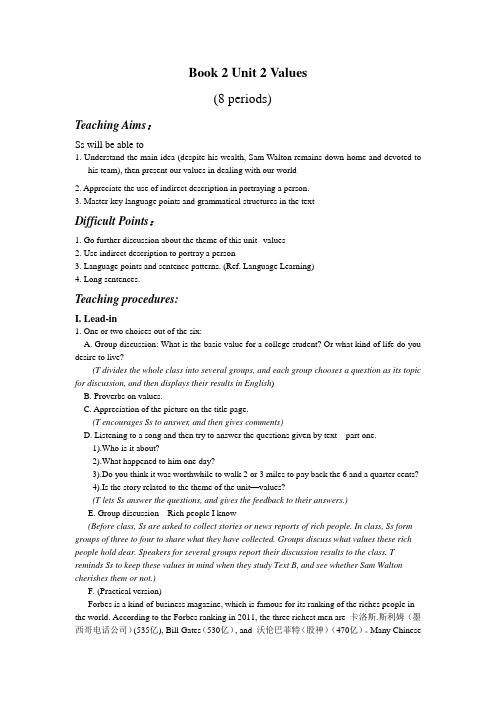
Book 2 Unit 2 Values(8 periods)Teaching Aims:Ss will be able to1. Understand the main idea (despite his wealth, Sam Walton remains down-home and devoted tohis team), then present our values in dealing with our world2. Appreciate the use of indirect description in portraying a person.3. Master key language points and grammatical structures in the textDifficult Points:1. Go further discussion about the theme of this unit--values2. Use indirect description to portray a person3. Language points and sentence patterns. (Ref. Language Learning)4. Long sentences.Teaching procedures:I. Lead-in1. One or two choices out of the six:A. Group discussion: What is the basic value for a college student? Or what kind of life do you desire to live?(T divides the whole class into several groups, and each group chooses a question as its topic for discussion, and then displays their results in English)B. Proverbs on values.C. Appreciation of the picture on the title page.(T encourages Ss to answer, and then gives comments)D. Listening to a song and then try to answer the questions given by text---part one.1).Who is it about?2).What happened to him one day?3).Do you think it was worthwhile to walk 2 or 3 miles to pay back the 6 and a quarter cents?4).Is the story related to the theme of the unit—values?(T lets Ss answer the questions, and gives the feedback to their answers.)E. Group discussion---Rich people I know(Before class, Ss are asked to collect stories or news reports of rich people. In class, Ss form groups of three to four to share what they have collected. Groups discuss what values these rich people hold dear. Speakers for several groups report their discussion results to the class. T reminds Ss to keep these values in mind when they study Text B, and see whether Sam Walton cherishes them or not.)F. (Practical version)Forbes is a kind of business magazine, which is famous for its ranking of the riches people in the world. According to the Forbes ranking in 2011, the three richest men are 卡洛斯.斯利姆(墨西哥电话公司)(535亿), Bill Gates(530亿), and 沃伦巴菲特(股神)(470亿)。
新标准大学英语第二册unit 2 教案
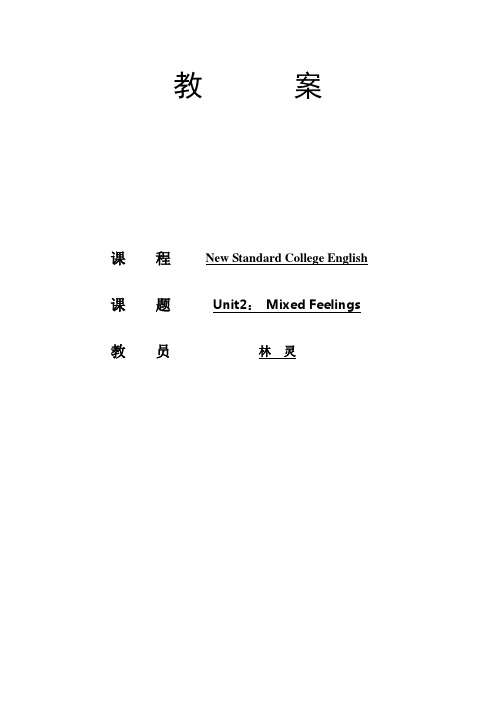
教案课程New Standard College English 课题Unit2: Mixed Feelings 教员林灵Unit Two Mixed FeelingsTeaching objectives:1.Ss acquire reading skills: 1) predicting 2) making use of examples 3) inferring2.Ss understand the important words and expressions in passage 1 and passage 2.3.Ss know how to use the key words in different contexts.4.Ss acquire speaking skills: telling a story.Teaching content:Book 2 Unit two Active reading 1 and Active reading 2; text organization; words and useful expressions; sentence patterns; background knowledge about the unit theme; language in use;Teaching focus and difficulties:text analysis; language points and sentence patterns; how to express one‘s feelings Teaching methods: Group discussion; pair work; explanation; exemplification Teaching aids: Multimedia, blackboardTime allotment: Active reading (1): 4 periodsActive reading (2): 3 periodsLanguage in use: 1 periodTeaching procedures:Active reading (1)Step 1 Lead-in (10 minutes)1.Ss look at some pictures and describe how the people feel.2.Ss discuss when they feel these emotions.e.g. I usually feel (upset) before an important exam.Words needed: happy, angry, shy, sad, depressed, frightened, annoyed, upset3.Ss read the definitions of empathy/ sympathy4.Ss distinguish one word from the other.Summary: Sympathy = I can imagine your painEmpathy = I FEEL your painStep 2 Global reading (30 minutes)1.Ss read the passage and answer the questions in Task 3.2.Elaborate on text organization.Governing idea (Para. 1): The development of the empathy starts very early in human development.Supporting idea 1 (Para. 2):feel sympathetic distressBackground (Para. 3): motor mimicry →empathySupporting idea 2 (Para. 4-5): understand the differenceSupporting idea 3 (Para. 6): individual differences appear3.Help Ss draw a timeline to see how empathy developed in children.Step 3 Detailed readingWords and Expressions (60 minutes)crawl v. & n.v. to move along the ground on your hands and knees or with your body close to the ground n. a very slow speed at which a vehicle moves forwards―crawl‖ in contextI felt my flesh crawl as he described the murder. 毛骨悚然Can you swim a crawl ? 自由泳The way you crawl to them makes me sick. 奉承,巴结Traffic was slowed to a crawl. 车辆缓慢行驶The weeks crawled by until we can meet again. 时间缓慢流逝Pub crawl 泡吧distress n. & v. a feeling that you have when you are very unhappy, worried, or upsetIt _____________ him to think that he has no hope of changing things.He arrived on Dick‘s doorstep in obvious __________.Einstein was ____________ at this sad news.discipline v. to train by instruction and exercise; drill 训练,指导,管教n. training to act in accordance with rules; drill 纪律,训练,管教e.g. school discipline 学校纪律The teacher can‗t keep discipline in her classroom.Science is an exact discipline.In learning a foreign language, question and answer drills are good disciplines. distinct adj. separate and different in a way that is clear有区别的,不同的Fill in the blanks with appropriate words.They were classified into two distinct groups. 他们被归入两种不同类型的群体。
- 1、下载文档前请自行甄别文档内容的完整性,平台不提供额外的编辑、内容补充、找答案等附加服务。
- 2、"仅部分预览"的文档,不可在线预览部分如存在完整性等问题,可反馈申请退款(可完整预览的文档不适用该条件!)。
- 3、如文档侵犯您的权益,请联系客服反馈,我们会尽快为您处理(人工客服工作时间:9:00-18:30)。
Unit 2 Mixed feelingsActive Reading 1 How empathy unfoldsI. Warming-up exercises1. Look at the following pictures and describe the emotion shown in each picture.2. Discuss the question: Do you sometimes try to hide your emotions? Why or why not?3. Skim the text, and find out the definition of empathy and sympathy in the passage.Empathy originates from a sort of physical imitation of the distress of another, which then evokes the same feelings in oneself. (Para. 3)Sympathy is felt for the general plight of another with no sharing of what that other person is feeling.4. Now decide whether the feelings or actions described below are a result of Sympathy(S)or Empathy (E).sending a card to someone who is in hospitalfeeling happy because your friend has won a scholarship to a prestigious universitytrying to comfort someone who has had bad newsreacting physically when you see that someone is in paincollecting money to help the victims of a natural disastercrying at the end of a filmSummary: Sympathy= I can understand your pain. Empathy= I feel your pain.II. Text OrganizationCf. ppt.III. Comprehending the text1. What did Hope do when she saw another baby fall?Tears welled up in her own eyes and she crawled off to be comforted by her mother.2. Why did Michael give his teddy bear to Paul?He did it to comfort Paul.3. Who observed and recorded these actions?The babies’ mothers observed and recorded these actions.4. When do psychologists believe that humans begin to experience empathy?They believe that humans begin to experience empathy virtually from the day they are born. 5. Which example shows that babies sometimes don’t realize they aren’t the ones who are suffering?The example of babies who imitate the distress of someone else.6. When was the word empathy first used in English to describe such reactions?The word empathy was first used in English in the 1920s by E. B. Titchener.7. Why was the word sympathy not appropriate?It is not appropriate because sympathy is felt for the general plight of another with no sharing of what that other person is feeling; empathy means actually sharing or imagining another person’s feelings.8. At what age do children start to distinguish other people’s feelings f rom their own?Around two and a half, children start to distinguish other people’s feelings from their own.9. How can parents increase feelings of empathy in their children?They can increase feelings of empathy in children by calling strong attention to the distress their misbehavior caused someone else.ⅣWords & Expressionsempathy n. [U] the ability to understand how someone feels because you can imagine what it is like to be them 同感;同情;移情➢empathy with/for sb./sth.empathy between A and Be.g. There is a strange empathy between the old lady and her grandson.老妇人和她孙子间有种莫名其妙的心灵相通的感觉。
empathic a.(also empathetic) able to understand how someone feels because you can imagine what it is like to be them 移情的;有同感的;产生共鸣的e.g. He was very empathic about what the people were suffering there.他非常同情那里的人们所受的苦。
well up1) (of a liquid) rise up to the surface and spill or be about to spill (液体)流出,涌出e.g. I felt tears well up in my eyes. 我感到泪水夺眶而出。
2) (of an emotion) arise and become more intense (情绪)变得强烈e.g. Anger welled up within him. 他怒火中烧。
crawl vi.1) move along on your hands and knees with your body close to the ground 爬,爬行;匍匐行进e.g. A baby crawls (around) before it can walk.婴儿先会(到处)爬, 然后才会走。
2) (of traffic, vehicles, etc.) move very slowly(指来往行人﹑车辆等)缓慢地行进, 徐缓而行e.g. The traffic crawled over the bridge in the rush-hour.在高峰时刻桥上的车辆行驶缓慢。
retrieve vt.(fml) find something and bring it back (正式)重新找回;收回,取回e.g. She bent down to retrieve her earring. 她俯下身去捡回她的耳环。
➢retrieve sth. frome.g. The wreckage of the crashed plane was retrieved from the ocean.失事飞机的残骸已经从海里打捞出来trace vt.1) discover the origin of something or how it developed 追究;追溯(来源)e.g. The style of these paintings can be traced back to early medieval influences.这些绘画的风格可以追溯到中世纪早期的影响。
2) find someone or something that you are looking for by asking questions and getting information 追查;追踪e.g. She had given up all hope of tracing her missing daughter.她已经放弃了寻找失踪女儿的所有希望。
infant n.[C] (fml) a baby or very young child 婴儿,幼儿e.g. a nursery for infants under two 两岁以下婴儿的托儿所Word family: infancy n.the period of a child’s life before they can walk or talk 婴儿期,幼儿期e.g. In the past, many children died in infancy.过去很多孩子夭折于襁褓。
virtually ad. almost 差不多,实质上,实际上e.g. Virtually all the children come to school by bus.差不多所有的孩子都是乘巴士来上学的。
